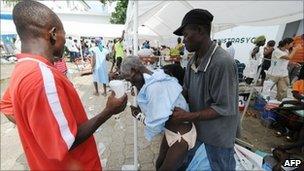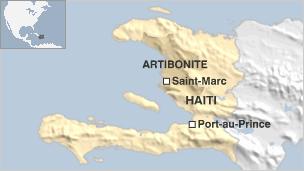Scores die in Haiti cholera outbreak
- Published
Hundreds of people received treatment in the car park of a hospital in Saint-Marc
A cholera outbreak has killed scores of people in central Haiti, President Rene Preval has confirmed.
At least 196 people have died and 2,634 have been hospitalised by the illness, which causes diarrhoea, acute fever, vomiting and severe dehydration.
Officials are taking steps to ensure the disease does not spread from the Artibonite and Central Plateau regions.
They fear the death toll could soar if the outbreak reaches camps housing the survivors of January's earthquake.
The disaster killed some 250,000 people and left 1.5 million homeless around the capital, Port-au-Prince.
Tens of thousands of people are still living in crowded tent cities with poor sanitation and little access to clean drinking water.
Officials believe the outbreak was caused by people drinking infected water from the Artibonite river.
Hospitals 'overwhelmed'
"I can confirm it is cholera," Mr Preval told Reuters news agency.
"Now we are making sure people are fully aware of precautionary measures they have to take to prevent contamination."
The director general of the health department, Dr Gabriel Thimote, said the worst-affected areas were Douin, Marchand Dessalines and areas around Saint-Marc, about 100km (60 miles) north of Port-au-Prince.
Local hospitals were "overwhelmed", and a number of people were being evacuated to clinics in other areas, he added.
At one point on Thursday, hundreds of people were laid out in the car park of St Nicholas hospital in Saint-Marc, with intravenous drips in their arms to treat dehydration, until it began to rain and they were rushed inside.
Some patients at the hospital said they became ill after drinking water from a public canal, but others said they had been drinking purified water.

Hospitals and clinics in the affected areas have been overwhelmed
"I ran to the bathroom four times last night vomiting," 70-year-old Belismene Jean Baptiste told the Associated Press.
Another man said three of his relatives had died within a matter of hours.
Local doctor Jhonny Fequiere told the BBC that he had seen 28 patients die and said his hospital in Marchand Dessalines was struggling to cope.
"We are trying to take care of people, but we are running out of medicine and need additional medical care. We are giving everything we have but we need more to keep taking care of people," he said.
The victims range in age, but the young and the elderly appear to be the worst-affected.
David Darg, a medical relief worker in Haiti, told the BBC he had visited an area near Saint-Marc which - according to local residents - was the source of the outbreak.

"We started heading out along narrow roads lined with villagers begging for water," he said.
"By now, they'd been seeing people dying in their communities and knew not to drink water from the river, which ordinarily would have been their main source of water."
This is the first time in a century that cholera has struck the Caribbean nation, the World Health Organization said.
The Artibonite department was not badly damaged in the earthquake but thousands of people who lost their homes have moved into camps or are living with relatives there.
"We have been afraid of this since the earthquake," said Robin Mahfood, president of Food for the Poor.
The agency was preparing to airlift donations of antibiotics, oral dehydration salts and other supplies to the affected areas.
- Published25 October 2010